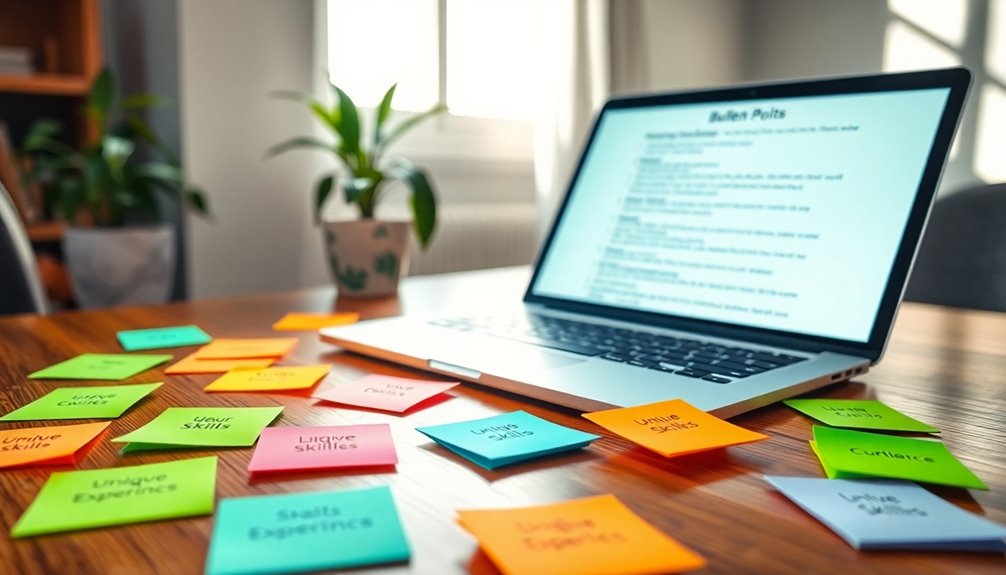Wearing jeans to a job interview can be a risky move. While some casual environments might accept them, most companies expect a more polished appearance. Research the company culture and dress code beforehand; business casual attire is usually a safer choice. Dressing slightly more formally shows respect and initiative, and helps create a strong first impression. Remember, nearly 75% of recruiters think candidates dress too casually. Opt for well-fitted, neutral colors to project professionalism. If you're curious about more specific tips to impress employers, you'll find valuable insights coming up next!
Key Takeaways
- Research the company's dress code to determine if jeans are acceptable for their culture and environment.
- For interviews, it's safer to opt for business casual attire instead of jeans.
- Dressing slightly more formally than the workplace norm demonstrates professionalism and respect for the opportunity.
- Avoid casual attire like jeans, as 75% of recruiters believe it can negatively impact your chances.
- A polished appearance boosts confidence and signals seriousness about the position, enhancing overall first impressions.
Importance of Company Culture

When preparing for a job interview, understanding the company's culture is essential for choosing the right attire. Company culture reflects the organization's values and expectations regarding professionalism, which directly influences your choice of appropriate attire. If the company has a casual dress culture, like many tech firms, they may accept jeans for employees. However, you should still opt for formal attire during the interview to make a positive impression.
Researching the company's dress code through their website or social media can provide valuable insights. This knowledge helps you gauge whether jeans might be acceptable for interviews. Remember, perceptions of jeans can vary greatly across industries. Conservative fields typically favor more formal attire, regardless of the company's casual dress culture.
Dressing slightly more formally than the company's usual attire demonstrates your respect for the opportunity and your understanding of professional standards. By aligning your outfit with the company values and industry expectations, you position yourself favorably in the eyes of your interviewers. Ultimately, your attire should reflect not just your personality but also your ability to adapt to the organizational environment. Additionally, understanding how financial factors influence the hiring process can also guide your preparation.
Business Casual vs. Jeans
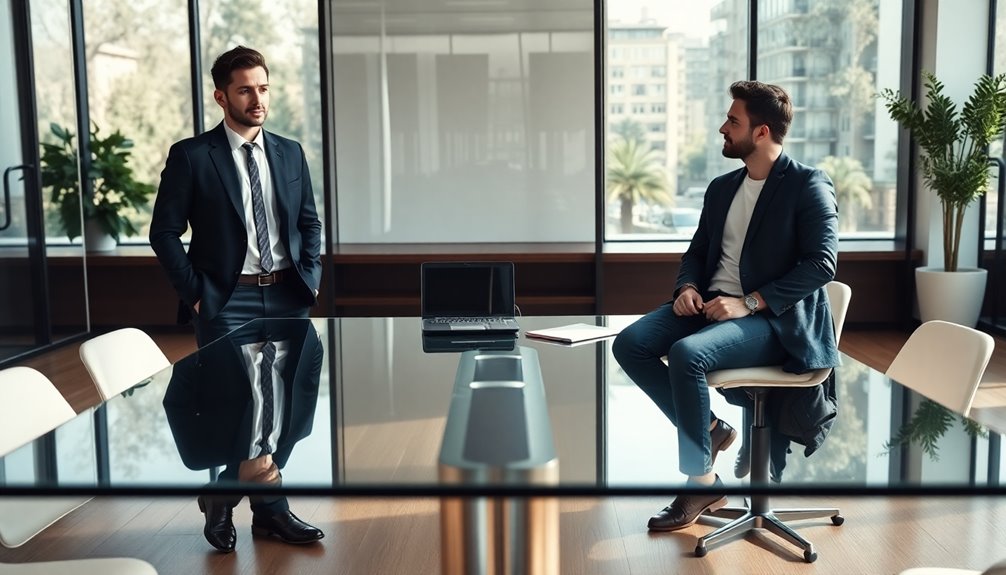
Choosing between business casual attire and jeans for a job interview can be a challenging decision. While some modern workplaces may accept clean, well-fitted jeans, you should generally err on the side of caution and opt for business casual attire. This choice not only reflects professionalism but also aligns with the company culture and dress code.
Here's a quick comparison to help you decide:
| Business Casual Attire | Jeans |
|---|---|
| Polished and professional | Often seen as too casual |
| Creates a positive impact | May convey a lack of seriousness |
| Aligns with traditional standards | Might not fit workplace standards |
First impressions are critical during interviews. By dressing in business casual attire, you signal that you respect the opportunity and take it seriously. Researching the company's dress code can guide you in selecting the right interview attire. Remember, when in doubt, it's better to prioritize a professional look that reflects your understanding of workplace standards rather than risk coming across as underdressed in jeans.
Interview Attire Guidelines
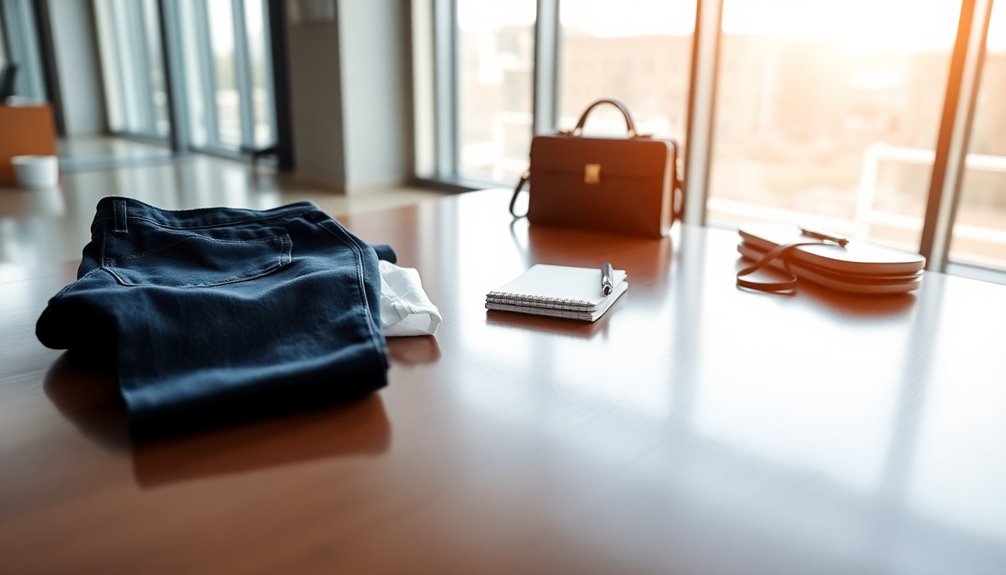
When preparing for a job interview, it's crucial to understand the dress code of the company you're applying to. A professional image can set the tone for the interaction, so opting for business casual over jeans is often the safer choice. Remember, making a strong first impression can greatly impact your chances of success.
Dress Code Awareness
Understanding the company's dress code is essential for making a positive impression during a job interview. Dress code awareness shows your professionalism and respect for the company's culture. To select appropriate attire, you should research the company's expectations on its website or social media. Here are some things to take into account:
- A polished appearance speaks volumes about your seriousness.
- Business casual is often the safest choice for most interviews.
- Clean clothing can boost your confidence and comfort.
- First impressions are lasting—make yours count!
- Dressing one level above the expected attire demonstrates respect for the opportunity.
While casual dress may be acceptable in some modern workplaces, particularly in tech, it's wise to err on the side of caution. Jeans are rarely acceptable in traditional corporate environments, where business formal or business casual clothing is preferred. Remember, your interview attire should reflect your understanding of the company culture and professionalism. By choosing the right outfit, you'll not only feel good but also make a strong first impression that could set the tone for the rest of the interview. Additionally, strong communication skills are vital in conveying confidence during your interview.
Professional Image Importance
Your professional image during a job interview can make a significant impact on the impression you leave with potential employers. Research shows that 75% of recruiters believe candidates often dress too casually, highlighting the importance of appropriate attire. Wearing professional clothing demonstrates respect for the opportunity and reflects your organizational skills and judgment.
Before the interview, take the time to research the company dress code. Aligning your attire with the corporate culture enhances your fit within the organization. A polished appearance is essential; clean, wrinkle-free, and well-fitted clothing boosts your overall confidence and shapes the hiring manager's perception of you.
Casual items, like jeans, are generally seen as inappropriate for interviews. Instead, opt for business casual or formal attire to convey professionalism. Remember, the first impression you make can be lasting, so choose wisely. Your attire not only represents you but also signals your understanding of the company's values and expectations. By dressing appropriately, you show that you're serious about the position and ready to contribute positively to the team. Additionally, just as in investing, where diversification of retirement portfolio is essential, varying your professional wardrobe can demonstrate your adaptability in different environments.
What to Avoid Wearing
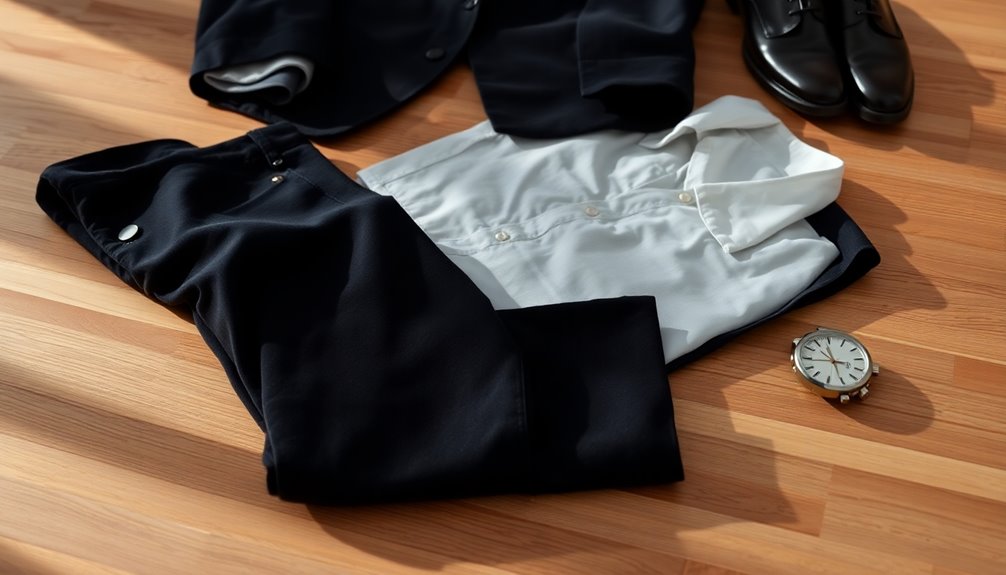
When you're preparing for a job interview, steer clear of casual attire like jeans and shorts, as they can undermine your professionalism. Ill-fitting clothes can not only be uncomfortable but also distract from your qualifications. Ultimately, avoid excessive accessories; they can shift focus away from what really matters—your skills and experience.
Casual Attire Pitfalls
Many candidates underestimate the impact of casual attire on their interview performance. Wearing jeans, especially ripped or distressed ones, can undermine your professional image and signal a lack of seriousness about the position. Even if the company culture seems relaxed, overly casual items like shorts, tank tops, or loungewear are inappropriate for interviews.
Here are some casual attire pitfalls to avoid:
- Bright colors or busy patterns that distract hiring managers
- Ill-fitting clothing that can cause discomfort during the interview
- Flashy accessories that detract from your overall presentation
- Excessive makeup that may leave a negative impression
- Wrinkled clothes that signal a lack of preparation
Opting for well-fitted clothing in neutral shades helps create a polished look that impresses hiring managers. Keeping your accessories simple and your makeup natural enhances your professional image, allowing your qualifications to shine through. Remember, the goal is to convey confidence and readiness for the role, so choose your outfit wisely. Avoiding these casual attire pitfalls will help you focus on what truly matters—your skills and experience.
Ill-fitting Clothes Risks
Wearing clothes that don't fit properly can undermine your confidence and distract from your qualifications during an interview. Ill-fitting clothing, whether too tight or too loose, can create an unprofessional appearance that suggests a lack of attention to detail and self-presentation. When your outfit hinders movement, it affects your body language, making you appear less confident and engaged.
Imagine fidgeting with a too-tight collar or adjusting loose pants throughout the interview; these distractions can detract from your message and overall performance. A tailored outfit, on the other hand, conveys professionalism and respect for the opportunity. It allows you to focus on your strengths rather than worrying about your appearance.
Choosing proper fitting interview attire not only enhances your look but also boosts your confidence. When you know you look good, you're more likely to communicate effectively and leave a positive impression. Avoid the risks associated with ill-fitting clothing by prioritizing fit and tailoring, ensuring your outfit highlights your qualifications rather than overshadowing them. Remember, the right fit can make all the difference in how you're perceived during those key moments.
Distracting Accessories Concerns
Accessories can greatly influence how you're perceived during a job interview, so it's important to choose wisely. You want to project a polished appearance while maintaining a professional demeanor. Here are some distracting accessories to avoid:
- Overly flashy jewelry that draws attention away from your qualifications
- Excessive makeup or bold colors that can overwhelm your natural beauty
- Hats and sunglasses, which may convey disinterest in the interview setting
- Large or noisy accessories like oversized earrings or bangles that can be distracting
- Any accessories that don't align with a minimal accessories approach
Enhancing Your Professional Image

Understanding the importance of a polished appearance can greatly impact your job interview success. Research shows that 75% of recruiters feel candidates often dress too casually, which can hurt your first impression. Opting for conservative, professional attire, like blazers or suits, is a good choice that enhances your image and shows you're serious about the opportunity.
While the company's dress code might lean towards business casual, dressing slightly more formally demonstrates initiative and respect for the interview process. This approach lets interviewers know you value the occasion and understand the importance of a polished appearance.
In addition to your outfit, pay attention to your accessories. Simple pieces that complement your attire without being distracting can elevate your professional look. A well-groomed hairstyle and neat clothing also contribute to a polished image, leaving a positive perception in the minds of your interviewers. Furthermore, maintaining good dental health is crucial, as it not only affects your smile but also influences your overall confidence during the interview.
Dressing for Success
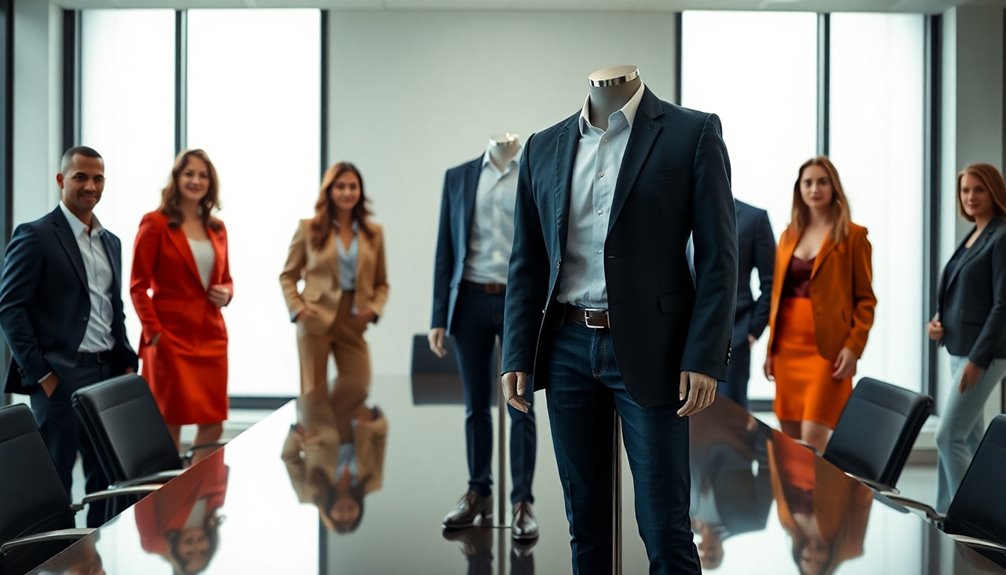
Dressing for success can greatly influence the outcome of your job interview. When you dress professionally, you're not just following the company dress code; you're making a strong first impression. Research shows that 75% of recruiters think candidates often dress too casually, which can hurt your chances. By opting for polished clothing in neutral colors like navy, black, gray, or beige, you'll project a more professional image that resonates well with interviewers.
To make a positive impression, consider these tips:
- Dress one level above the expected workplace attire
- Choose well-fitted, polished clothing
- Research the company culture for guidance on business casual options
- Avoid bright or busy patterns that can distract
- Showcase a serious attitude through your overall appearance
Additionally, remember that your overall presentation, including your credit score, can influence how potential employers perceive your professionalism and reliability.
Frequently Asked Questions
Is Wearing Jeans to a Job Interview Okay?
Wearing jeans to a job interview isn't usually a great idea. You want to make the best impression, and jeans can come off as too casual. Even in relaxed environments, it's better to dress slightly more formally than you think is expected. Research the company culture beforehand, as some creative fields might allow for it. Ultimately, erring on the side of professionalism can help you stand out positively to potential employers.
How Should I Dress to Impress for an Interview?
Dressing for an interview is like painting a masterpiece; every detail counts. You should aim for business casual attire that reflects your professionalism and complements the company's culture. Stick to neutral colors like navy or gray to keep your look polished. Make sure your clothes fit well and are wrinkle-free, as comfort boosts confidence. Simple accessories and clean shoes can tie your outfit together, helping you leave a lasting impression.
Is It Unprofessional to Wear Jeans to Work?
You might find that wearing jeans to work can be seen as unprofessional, especially in traditional settings. Many companies expect a more polished look, particularly during important meetings. While some industries embrace a casual dress code, it's essential to understand your workplace's culture. If you're unsure, it's better to err on the side of caution and choose more formal attire to guarantee you convey the right level of professionalism.
Can I Wear Jeans to a Smart Casual Interview?
You can wear jeans to a smart casual interview, but make sure to choose wisely. Opt for clean, well-fitted jeans without rips or distressing. Pair them with a polished top, like a blazer or a smart blouse, to elevate your look. Avoid overly casual items like t-shirts or sneakers; instead, wear smart shoes to maintain a professional image. When in doubt, it's better to dress slightly more formal than the company's usual attire.
Conclusion
In the end, it's all about knowing your audience. When you understand the company culture, feel confident in your choices, and project a polished image, you're setting yourself up for success. Whether you opt for jeans or a suit, remember: it's not just what you wear, but how you wear it. Dress with intention, present yourself with poise, and leave a lasting impression. Be authentic, be professional, and embrace the opportunity to shine!


